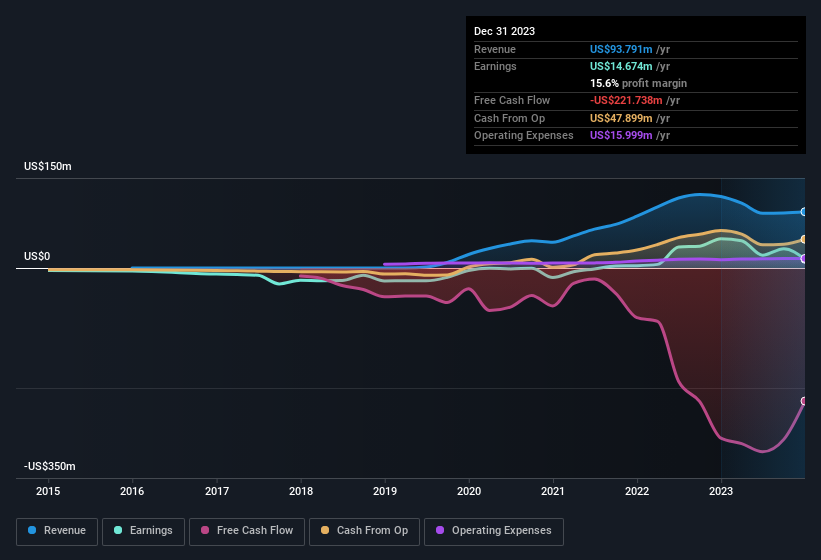- Israel
- /
- Oil and Gas
- /
- TASE:NVPT
Navitas Petroleum Limited Partnership's (TLV:NVPT) Weak Earnings May Only Reveal A Part Of The Whole Picture

The subdued market reaction suggests that Navitas Petroleum, Limited Partnership's (TLV:NVPT) recent earnings didn't contain any surprises. However, we believe that investors should be aware of some underlying factors which may be of concern.
Check out our latest analysis for Navitas Petroleum Limited Partnership

Zooming In On Navitas Petroleum Limited Partnership's Earnings
As finance nerds would already know, the accrual ratio from cashflow is a key measure for assessing how well a company's free cash flow (FCF) matches its profit. The accrual ratio subtracts the FCF from the profit for a given period, and divides the result by the average operating assets of the company over that time. You could think of the accrual ratio from cashflow as the 'non-FCF profit ratio'.
Therefore, it's actually considered a good thing when a company has a negative accrual ratio, but a bad thing if its accrual ratio is positive. While it's not a problem to have a positive accrual ratio, indicating a certain level of non-cash profits, a high accrual ratio is arguably a bad thing, because it indicates paper profits are not matched by cash flow. To quote a 2014 paper by Lewellen and Resutek, "firms with higher accruals tend to be less profitable in the future".
Over the twelve months to December 2023, Navitas Petroleum Limited Partnership recorded an accrual ratio of 0.28. Therefore, we know that it's free cashflow was significantly lower than its statutory profit, raising questions about how useful that profit figure really is. Over the last year it actually had negative free cash flow of US$222m, in contrast to the aforementioned profit of US$14.7m. We also note that Navitas Petroleum Limited Partnership's free cash flow was actually negative last year as well, so we could understand if shareholders were bothered by its outflow of US$222m.
Note: we always recommend investors check balance sheet strength. Click here to be taken to our balance sheet analysis of Navitas Petroleum Limited Partnership.
Our Take On Navitas Petroleum Limited Partnership's Profit Performance
Navitas Petroleum Limited Partnership's accrual ratio for the last twelve months signifies cash conversion is less than ideal, which is a negative when it comes to our view of its earnings. Because of this, we think that it may be that Navitas Petroleum Limited Partnership's statutory profits are better than its underlying earnings power. In further bad news, its earnings per share decreased in the last year. At the end of the day, it's essential to consider more than just the factors above, if you want to understand the company properly. If you want to do dive deeper into Navitas Petroleum Limited Partnership, you'd also look into what risks it is currently facing. For example, Navitas Petroleum Limited Partnership has 3 warning signs (and 2 which are significant) we think you should know about.
This note has only looked at a single factor that sheds light on the nature of Navitas Petroleum Limited Partnership's profit. But there are plenty of other ways to inform your opinion of a company. Some people consider a high return on equity to be a good sign of a quality business. So you may wish to see this free collection of companies boasting high return on equity, or this list of stocks that insiders are buying.
Valuation is complex, but we're here to simplify it.
Discover if Navitas Petroleum Limited Partnership might be undervalued or overvalued with our detailed analysis, featuring fair value estimates, potential risks, dividends, insider trades, and its financial condition.
Access Free AnalysisHave feedback on this article? Concerned about the content? Get in touch with us directly. Alternatively, email editorial-team (at) simplywallst.com.
This article by Simply Wall St is general in nature. We provide commentary based on historical data and analyst forecasts only using an unbiased methodology and our articles are not intended to be financial advice. It does not constitute a recommendation to buy or sell any stock, and does not take account of your objectives, or your financial situation. We aim to bring you long-term focused analysis driven by fundamental data. Note that our analysis may not factor in the latest price-sensitive company announcements or qualitative material. Simply Wall St has no position in any stocks mentioned.
About TASE:NVPT
Navitas Petroleum Limited Partnership
Explores for, develops, and produces oil and natural gas in North and South America.
Imperfect balance sheet minimal.


